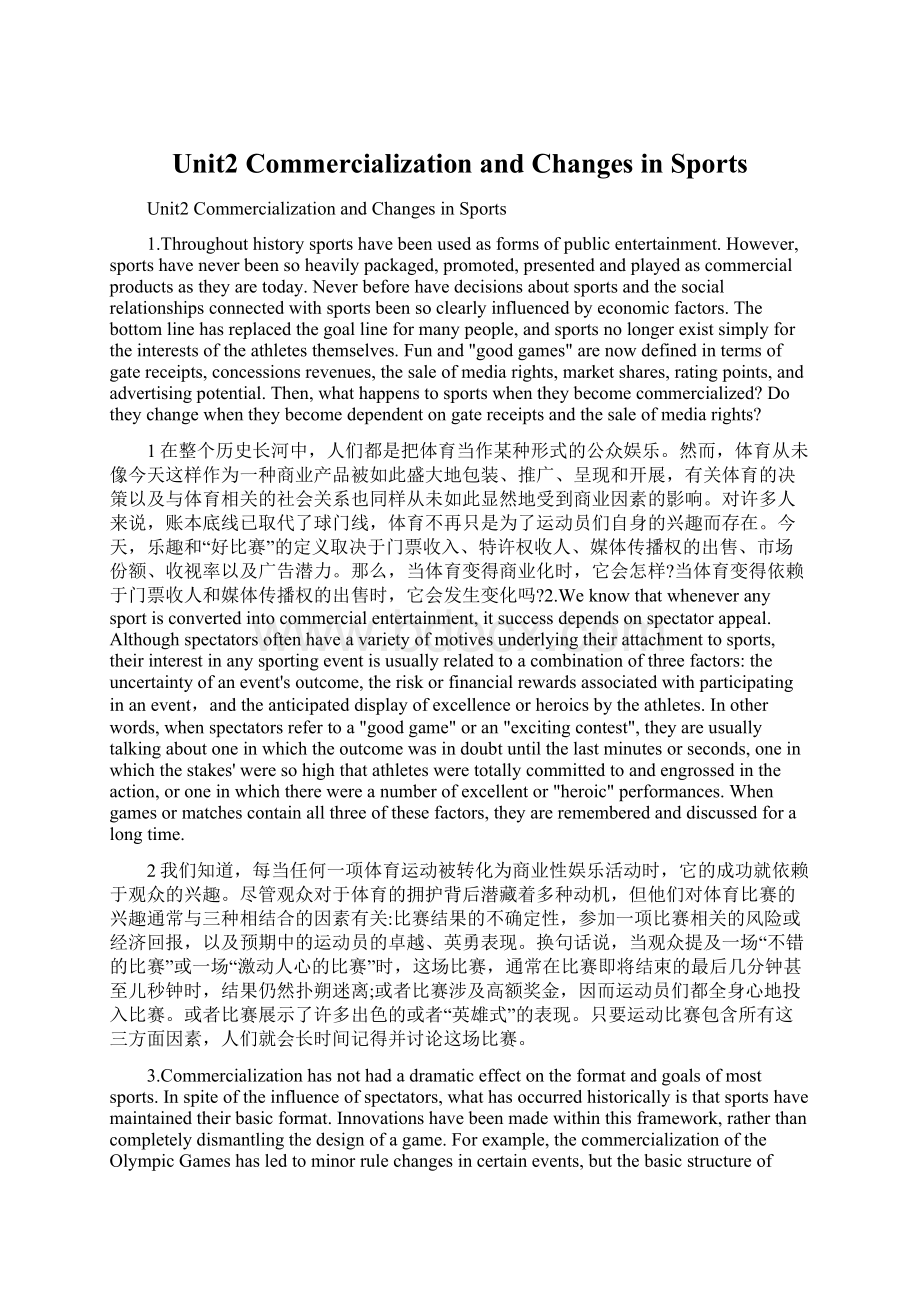Unit2 Commercialization and Changes in Sports.docx
《Unit2 Commercialization and Changes in Sports.docx》由会员分享,可在线阅读,更多相关《Unit2 Commercialization and Changes in Sports.docx(4页珍藏版)》请在冰豆网上搜索。

Unit2CommercializationandChangesinSports
Unit2CommercializationandChangesinSports
1.Throughouthistorysportshavebeenusedasformsofpublicentertainment.However,sportshaveneverbeensoheavilypackaged,promoted,presentedandplayedascommercialproductsastheyaretoday.Neverbeforehavedecisionsaboutsportsandthesocialrelationshipsconnectedwithsportsbeensoclearlyinfluencedbyeconomicfactors.Thebottomlinehasreplacedthegoallineformanypeople,andsportsnolongerexistsimplyfortheinterestsoftheathletesthemselves.Funand"goodgames"arenowdefinedintermsofgatereceipts,concessionsrevenues,thesaleofmediarights,marketshares,ratingpoints,andadvertisingpotential.Then,whathappenstosportswhentheybecomecommercialized?
Dotheychangewhentheybecomedependentongatereceiptsandthesaleofmediarights?
1在整个历史长河中,人们都是把体育当作某种形式的公众娱乐。
然而,体育从未像今天这样作为一种商业产品被如此盛大地包装、推广、呈现和开展,有关体育的决策以及与体育相关的社会关系也同样从未如此显然地受到商业因素的影响。
对许多人来说,账本底线已取代了球门线,体育不再只是为了运动员们自身的兴趣而存在。
今天,乐趣和“好比赛”的定义取决于门票收入、特许权收人、媒体传播权的出售、市场份额、收视率以及广告潜力。
那么,当体育变得商业化时,它会怎样?
当体育变得依赖于门票收人和媒体传播权的出售时,它会发生变化吗?
2.Weknowthatwheneveranysportisconvertedintocommercialentertainment,itsuccessdependsonspectatorappeal.Althoughspectatorsoftenhaveavarietyofmotivesunderlyingtheirattachmenttosports,theirinterestinanysportingeventisusuallyrelatedtoacombinationofthreefactors:
theuncertaintyofanevent'soutcome,theriskorfinancialrewardsassociatedwithparticipatinginanevent,andtheanticipateddisplayofexcellenceorheroicsbytheathletes.Inotherwords,whenspectatorsrefertoa"goodgame"oran"excitingcontest",theyareusuallytalkingaboutoneinwhichtheoutcomewasindoubtuntilthelastminutesorseconds,oneinwhichthestakes'weresohighthatathletesweretotallycommittedtoandengrossedintheaction,oroneinwhichtherewereanumberofexcellentor"heroic"performances.Whengamesormatchescontainallthreeofthesefactors,theyarerememberedanddiscussedforalongtime.
2我们知道,每当任何一项体育运动被转化为商业性娱乐活动时,它的成功就依赖于观众的兴趣。
尽管观众对于体育的拥护背后潜藏着多种动机,但他们对体育比赛的兴趣通常与三种相结合的因素有关:
比赛结果的不确定性,参加一项比赛相关的风险或经济回报,以及预期中的运动员的卓越、英勇表现。
换句话说,当观众提及一场“不错的比赛”或一场“激动人心的比赛”时,这场比赛,通常在比赛即将结束的最后几分钟甚至儿秒钟时,结果仍然扑朔迷离;或者比赛涉及高额奖金,因而运动员们都全身心地投入比赛。
或者比赛展示了许多出色的或者“英雄式”的表现。
只要运动比赛包含所有这三方面因素,人们就会长时间记得并讨论这场比赛。
3.Commercializationhasnothadadramaticeffectontheformatandgoalsofmostsports.Inspiteoftheinfluenceofspectators,whathasoccurredhistoricallyisthatsportshavemaintainedtheirbasicformat.Innovationshavebeenmadewithinthisframework,ratherthancompletelydismantlingthedesignofagame.Forexample,thecommercializationoftheOlympicGameshasledtominorrulechangesincertainevents,butthebasicstructureofeachOlympicsporthasremainedmuchthesameasitwasbeforethedaysofcorporateendorsementsandthesaleoftelevisionrights.
3商业化对于大多数体育运动的结构和目标没有太大的影响。
尽管观众会对其产生影响,但在历史上,运动项目保持了它们的基本结构。
创新也是在这一框架内进行的,并不会完全废除这项运动的基本设计。
例如、奥运会的商业化导致了某些赛事规则的微小变化但其每项运动的基本结构还是和商家赞助及电视转播权出售之前基本一致。
4.Commercializationseemstoaffecttheorientationsofsportparticipantsmorethanitdoestheformatandgoalsofsports.Tomakemoneyonasport,it'snecessarytoattractamassaudiencetobuyticketsorwatchtheeventsontelevision.Attractingandentertainingamassaudienceisnoteasybecauseit'smadeupofmanypeoplewhodon'thavetechnicalknowledgeaboutthecomplexathleticskillsandstrategiesusedbyplayersandcoaches.Withoutthistechnicalknowledge,peopleareeasilyimpressedbythingsextrinsictothegameormatchitself;theygettakeninbyhype.Duringtheeventitselftheyoftenfocusonthingstheycaneasilyunderstand.Theyenjoysituationsinwhichplayerstakerisksandfaceclearphysicaldanger;theyareattractedtoplayerswhoaremastersofdramaticexpressionorwhoarewillingtogobeyondandtheirnormalphysicallimitstothepointofendangeringtheirsafetyandwell-being;andtheyliketoseeplayerscommittedtovictorynomatterwhatthepersonalcost.
4看来,与运动的结构和目的相比,商业化更多的是影响运动参与者的取向。
若要通过一项运动盈利,就必须吸引广大观众买门票或在电视上观看比赛。
吸引和娱乐广大观众并非易事,因为这些观众中有很多人没有技木性的知识,因而不懂得运动员和教练采取的复杂竞技技巧和策略。
由于缺乏这些技术性知识,人们容易受到运动或赛事之外的东西的影响,容易受到天花乱坠的宜传的迷惑。
在比赛期间,他们经常关注那些他们容易理解的事情。
他们喜欢那种运动员冒险并明显面临身体危险的情境,他们喜爱那些搜长戏剧化表现或者愿意超越正常的生理极限以致威胁到自己的安全和健康的运动员。
他们喜欢看到运动员不惜代价,立志求胜。
5.Forexample,whenpeoplelacktechnicalknowledgeaboutbasketball,theyaremorelikelytotalkaboutasingleslamdunksthanabouttheconsistentlyflawlessdefensethatenabledateamtowinagame.Similarly,thosewhoknowlittleaboutthetechnicalaspectsoficeskatingaremoreentertainedbytripleandquadruplejumpsthanbyroutinescarefullychoreographedandpracticeduntiltheyaresmoothandflawless.Withoutdangerousjumps,naivespectatorsgetbored.Theylikeathleteswhoproject'excitingorcontroversialpersonas,andtheyoftenrateperformancesintermsofdramaticexpressionleadingtodramaticresults.Theywanttoseeathletesoccasionallycollapseastheysurpassphysicallimits,notathleteswhoknowtheirlimitssowelltheycansuccessfullycompeteforyearswithoutgoingbeyondthem.
5比如,当人们缺乏篮球方面的技术知识时,他们更津津乐道于某一个灌篮,而不会关注球队取胜必需的因素:
自始至终配合得天衣无缝的后防。
同样,那些对滑冰技术知之甚少的人,他们更感兴趣的是三连跳或四连跳,而不是那些精心设计并训练直至流畅、完美的舞步。
没有惊险的跳跃,无知的观众会感到厌倦。
他们喜欢那些表现得激动人心或有争议性的运动员。
他们往往根据戏剧化的表现是否导致戏剧化的结果来评价比赛。
他们想看运动员在超越自己极限时偶尔的突然失败,而不是多年来稳操胜券,熟知自己极限而不去超越它的运动员。
6.Whenasportcomestodependonentertainingamassaudience,thoseinvolvedinthesportoftenrevisetheirideasaboutwhatisimportantinsport.ThisrevisionusuallyinvolvesashiftinemphasisfromwhatmightbecalledanaestheticorientationtoaheroicorientationInfact,thepeopleinsportmayevenrefertogamesormatchesas"show-time",theymayrefertothemselvesasentertainersaswellasathletes.Thisdoesnotmeanthataestheticorientationsdisappear,butitdoesmeanthattheyoftentakeabackseattotheheroicactionsthatentertainspectatorswhodon'tknowenoughtoappreciatethestrategicandtechnicalaspectsofthegameormatch.
6当一项体育运动变得依赖于娱乐广大观众时,对于运动中什么才是重要的,运动参与者们往往会改变观念。
这一改变常常意味着重心从所谓的美学取向向英雄主义取向转变。
其实,运动员可能甚至把运动或比赛称为“表演秀”,并把自己称作表演者兼运动员。
这并不意味着美学取向不复存在了,但是这确实意味着与英雄主义行为相比,它们常常退居其后。
英雄主义行为吸引着那些没有足够的知识欣赏运动或比赛的策略和技术的观众。
7.Astheneedtopleasenaiveaudiencesbecomesgreater,sodoestheemphasisonheroicorientations.ThisiswhytelevisioncommentatorsforUSfootballgamescontinuallytalkaboutdanger,injuries,playingwithpain,andcourage.Someathletes,however,realizethedangersassociatedwithheroicorientationsandtrytoslowthemoveawayfromaestheticorientationsintheirsports.Forexample,someformerfigureskatershavecalledforrestrictionsonthenumberoftriplejumpsthatcanbeincludedinskatingprograms.Theseskatersareworriedthatthecommercialsuccessoftheirsportiscomingtorelyonthedangerofmovementratherthanthebeautyofmovement.However,someskatersseemtobewillingtoadoptheroicorientationsifthisiswhatwillpleaseaudiencesandgeneraterevenues.Theseathletesusuallyevaluatethemselvesandotherathletesintermsofthesportethic,andtheylearntoseeheroicactionssignsoftruecommitmentanddedicationtotheirsport.
7取悦无知观众的需求越强烈,就越会强调英雄主义取向。
这就是为什么美国橄榄球比赛的电视评论员喋喋不休地谈论危险、受伤、带伤比赛和胆量。
不过,有些运动员意识到了与英雄主义取向随之而来的危险,并试图在他们的运动中放慢偏离美学取向的步伐。
比如,一些前花样滑冰运动员已经呼吁限制滑冰项目中三连跳的数量。
这些滑冰运动员担心,他们的体育项目在商业上的成功正越来越依赖于动作的危险性,而不是动作的美感。
然而,另外一些滑冰运动员似乎愿意采取英雄主义取向,只要这样能取悦观众,获得收入。
这些运动员用体育道德规范去评价自己和他人,他们还学会把英雄主义行为看成是真正地投入及为运动献身的标志。
Commercializationalsoleadstochangesintheorganizationsthatcontrolsports.Whensportsbegintodependongeneratingrevenues,thecontrolofsportorganizationsusuallyshiftsfurtherandfurtherawayfromtheplayers.Infact,theplayersoftenloseeffectivecontrolovertheconditionsoftheirownparticipationinthesport.Theseconditionscomeunderthecontrolofgeneralmanagers,teamowners,corporatesponsors,advertisers,mediapersonnel,marketingandpublicitystaff,professionalmanagementstaff,accountants,andagents.
8商业化同样会导致那些控制体育的组织发生变化。
当体育开始依赖于创造收入时,体育组织的控制权就会离运动员越来越远。
事实上,运动员常常对于自身的体育参与环境失去有效控制。
这些环境越来越受控于下列人员:
总经理、运动队老板、企业赞助商、广告商、传媒人员、营销和宜传推广人员、专业管理人员、会计师以及经纪人。
9..Theorganizationsthatcontrolcommercialsportsareusuallycomplex,sincetheyareintendedtocoordinatetheinterestsofallthesepeople,buttheirprimarygoalistomaximizerevenues.Thismeansthatorganizationaldecisionsgenerallyreflectthecombinedeconomicinterestsofmanypeoplehavingnodirectpersonalconnectionwithasportorwiththeathletesinvolved.Thepowertoaffectthesedecisionsisgroundedinavarietyofresources,manyofwhicharenotevenconnectedwithsports.Thereforeathletesinmanycommercialsportsfindthemselvescutoutofdecision-makingprocessesevenwhendecisionsaffecttheirhealthandwell-being.
9那些控制商业体育的组织通常非常复杂,这是因为它们企图协调上述所有人的利益,但它们的首要目标还是盈利最大化。
这意味着组织决策通常反映的是许多人的混合利益,而他们与体育或相关运动员没有直接联系。
影响这些决策的力量根植于各种不同的资源,其中许多甚至与体育没有关联。
因此,许多商业体育中的运动员发现自己被逐出了决策过程,即便这些决策影响到他们的健康和幸福。